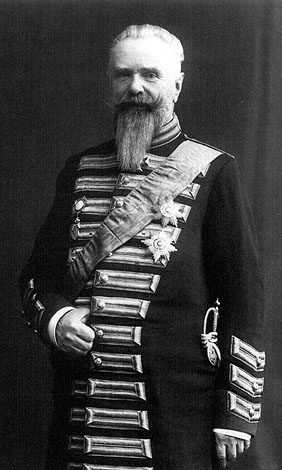Boris Shturmer

Baron Boris Vladimirovich Stürmer (Russian: Бори́с Влади́мирович Штю́рмер, Boris Vladimirovich Shtyurmer) (27 July 1848 - 9 September 1917) was a Russian courtier who has passed into history "as an obsequious follower of Rasputin, of whom he was only the puppet".[1] He served as Prime Minister, Foreign Minister, and Interior Minister of the Russian Empire for several months during 1916.
Sturmer was born into a landowning family in the Bezhetsk district of Tver Oblast. His father Vladimir Vilgemovich Sturmer was a retired Captain of Cavalry in the Imperial Russian Army. His mother was Ermoniya Panina.
A graduate of the Law Faculty of St. Petersburg University, Stürmer enjoyed a good relationship with a conservative court clique that engineered his appointment as Governor of Novgorod in 1894 and Yaroslavl in 1896. Despite recurrent rumours of financial mismanagement, Stürmer became one of the most trusted bureaucrats working under Vyacheslav von Plehve and was admitted into the State Council of Imperial Russia in 1904. He aspired to succeed Plehve in office and the Tsar even signed an ukase to that effect, yet the post eventually went to Prince Svyatopolk-Mirsky.
Stürmer's career took a plunge under Pyotr Stolypin, but he resurfaced in connection with the 1913 countrywide celebrations of the tercentenary of the Romanov Dynasty, when he accompanied the Tsar on a journey along the Volga and was nominated for the post of the mayor of Moscow. Stürmer's election bid was unsuccessful, but he managed to win the trust of a circle associated with Grigory Rasputin.
At the height of World War I, Stürmer petitioned Tsar Nicholas II to sanction the change of his German surname to Panin.[2] Since the Panins were a distinguished family of Russian nobility, the monarch could not agree to Stürmer's request until he had consulted all members of the Panin family. Pending these proceedings, Stürmer was appointed Prime Minister with a high degree of political latitude (20 January 1916). He was simultaneously acting as Minister of the Interior (from March 1916) and Minister of Foreign Affairs (from July).
Stürmer's government was deeply unpopular with all ranks. He was suspected of archreactionary views and Germanophilia. His ill-starred attempt to conscript non-Russians into the active army touched off a bloody Kyrgyz uprising known as the Urkun. After the collapse of the Brusilov Offensive it transpired that Stürmer had entered into separate peace talks with Germans. On 1 November Paul Miliukov, concluding that Stürmer's policies placed in jeopardy the Triple Entente, delivered his famous "stupidity or treason" speech at the State Duma. Even the Tsar had to concede that Stürmer was as much of a red rag to the parliament as to everyone else.[3] On 19 November he was sacked.
Following his resignation, Stürmer ran for a seat in the fifth State Duma. He was arrested by the Russian provisional government after the February Revolution in 1917 and died at the Peter and Paul Fortress later that year.
References
- ^ Quoted from: Sir Bernard Pares. A History of Russia. Knopf, 1953. Page 482.
- ^ Letters of Nicholas II to his wife, Jan. 1916
- ^ Massie, Robert K., Nicholas and Alexandra, New York, Ballantine Books, 1967, ISBN 0345438310.
